10 Best Quantum Mechanics Courses for 2025
Want to learn quantum mechanics without enrolling in a university? Choose from the best courses and books handpicked for our guide.

Quick Access:
- Comprehensive: Stanford, MIT, Hong Kong, Udemy, in Hindi
- Specific: Non-mathematical Overview, Quantum Optics, Quantum Computing
- Books: Griffiths, Shankar
The Nobel Prize-winning Richard Feynman famously said, “I think I can safely say that nobody understands quantum mechanics.”
Having spent the last several days researching and sampling online courses and books on quantum mechanics, I can safely say that I certainly don’t understand quantum mechanics.
But if you want to learn this fascinating subject without going to a university, I’ve compiled the best resources for this Best Courses Guide (BCG) so you can safely begin your studies. Several of the courses are created by top universities including MIT, Stanford, Delft University of Technology, and École Polytechnique.
Be aware, though, that unless you have a strong background of classical physics and mathematics including linear algebra and calculus, you are likely to find them challenging. One exception is the mini-course by minutephysics that explains the general concepts in a visual way without diving into the mathematics.
Click on the shortcuts for more details:
- Top Picks
- What is Quantum Mechanics?
- How to Study Quantum Mechanics
- Courses Overview
- Honorable Mentions
- What Next?
- Why You Should Trust Us
- How We Made Our Picks and Tested Them.
Here are our top picks
Click to skip to the course details:
Related Guides
What is Quantum Mechanics?
Classical physics was sufficient to explain the world for centuries, but as scientists probed deeper into the microscopic realm and made more and more precise measurements at the atomic and subatomic scales, classical physics began to fail. These failures ultimately led to the development of quantum mechanics, which provides a more accurate description of the behavior of these particles and systems.
Key differences between classical physics and quantum mechanics:
- Determinism vs Probability: classical physics is deterministic, meaning the future state of a system can be predicted from its initial conditions and the laws of motion. On the other hand, quantum mechanics is probabilistic – it predicts the probability of different possible outcomes.
- Particle vs Wave Nature: in classical physics, particles are treated as discrete objects following well-defined trajectories. Quantum mechanics describes particles as also having a wave-like nature, meaning they are affected by interference and exist in a superposition of multiple states.
- Uncertainty Principle: classical physics allows precise and simultaneous measurement of a particle’s position and momentum. In quantum mechanics, the Heisenberg uncertainty principle states that the more precisely one property is measured, the less precisely the other can be known.
- Quantum Phenomena: quantum mechanics predicts and explains phenomena that have no classical analogue, such as quantum entanglement, quantum tunneling, and the quantization of energy, momentum, and other quantities.
How to Study Quantum Mechanics
Unlike other studies such as learning a language, the emphasis is less on memorization and more on understanding the underlying science and mathematics. But you’ll still need to learn some formulae, focus on your studies and make it a habit.
Firstly, are you ready to tackle the demanding subject of quantum mechanics? Do you have a solid foundation of classical physics and mathematical topics (particularly calculus, vectors, and linear algebra)? Might you need to take some online courses in these first?
Some guides recommend you read the third volume of Feynman’s Lectures on Physics, which provides an intuitive introduction to quantum mechanics, which will give you a conceptual understanding of the key ideas without the heavy mathematics.
While online learning can be convenient, textbooks can add a feeling of reality. The tactile experience of leafing through a book, looking up a topic in the index and then reading about it in the text can sometimes help you learn and remember it better. I’ve recommended a couple of the top textbooks in this list of resources.
Work through the problems in your textbooks and courses to solidify your understanding. And when I say work through them, don’t just read through and think for a few minutes before looking at the answer! Our brains work best when we can connect new thoughts to concepts we already know and sometimes we need to try some creative thinking to discover HOW to solve an unexpected problem. Let your brain explore various paths and possible solutions without making it a sprint to the result.
In spaced repetition, you revise new material frequently. Starting with repeating tomorrow what you learned today, you then gradually extend the time between repetitions. Anki and Brainscape are designed to help you review flashcards at spaced intervals. You don’t need to worry about coming back to the material as they use algorithms to adjust the timing of reviews according to how well you remember each item in the previous session: got it right – review it again at a later time; got it wrong – review it more frequently.
With dedication and the help of the resources in this best quantum mechanics courses guide, you can teach yourself quantum mechanics to a high level, even without a formal physics background.
The key is to build up the necessary mathematical maturity, learn the core principles and equations, and then practice applying them to increasingly complex problems. With the right resources and persistence, you can master this fascinating field.
Courses Overview
- All courses except one are free or free to audit
- 5 courses offer a certificate of completion
- The Quantum Mechanics subject is followed by 50.3K learners on Class Central
- Courses in this guide have around 1.5 million enrollments and views.
Best Comprehensive Quantum Mechanics Course (Stanford)

If you are a student or professional with a background in physical science or engineering, Quantum Mechanics for Scientists and Engineers 1 covers the fundamental concepts and applications of quantum mechanics in various fields. The course aims to make quantum mechanics accessible to a broad audience, emphasizing its importance in modern technology and providing a substantial foundation in its principles and applications.
Syllabus:
- Introduction to Quantum Mechanics
- Importance in modern technology
- Bizarre aspects and evolution
- Fundamental Concepts
- Schroedinger’s wave equation
- Probability densities, linearity
- “Two slit” experiment and paradoxes
- Quantum Behavior and Mathematics
- “Particle in a box”
- Eigenvalues and eigenfunctions
- Mathematics of quantum mechanical waves
- Time-Varying Quantum Systems
- Superposition of wave functions
- The harmonic oscillator
- Wave packets, group velocity, and particle current
- Measurement and Operators
- Operators in quantum mechanics
- Quantum-mechanical Hamiltonian
- Measurement paradoxes, Stern-Gerlach experiment
- Simplifying Quantum Mechanics
- General mathematical approaches
- Functions, operators, matrices, Dirac notation
- Operators and measurable quantities
- The uncertainty principle
- Complex Quantum Systems
- Angular momentum and atomic orbitals
- Quantum mechanics with multiple particles
- Solving the hydrogen atom
- Problem Solving in Quantum Mechanics
- Approximation methods.
If you enjoyed this course, go on to Quantum Mechanics for Scientists and Engineers 2 (63-90 hours).
| Provider | edX |
| University | Stanford University |
| Instructor | David Miller |
| Workload | 45-90 hours |
| Enrollment | 30K |
| Rating | 4.5/5.0 (18) |
| Cost | Free audit |
| Quizzes/Assessment Items | Some practice quizzes, some paid |
| Certificate | Paid |
Best Quantum Mechanics Course with Free Access to Assignments and Exams (MIT)
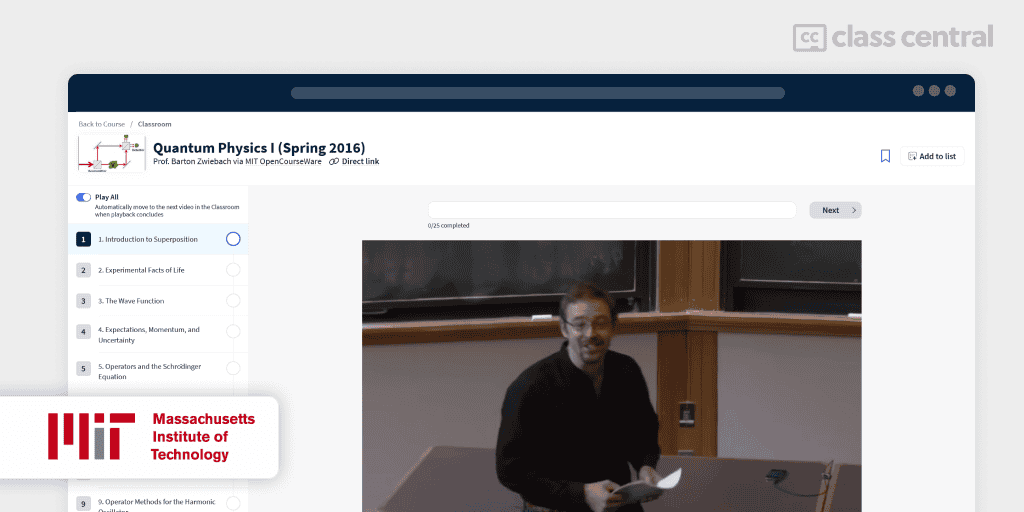
Who better than MIT to teach a quantum mechanics course? Quantum Physics I (Spring 2013). Select the Start learning button to access the videos, and use the Direct link to find the readings, lecture notes, assignments and solutions, exams, and study materials from the spring 2013 session of the course.
You will learn:
- Introduction to superposition
- Experimental facts of life, the wave function, expectations, momentum, and uncertainty
- Operators and the Schrödinger equation, time evolution, more on energy eigenstates
- Quantum harmonic oscillator and operator methods
- Quantum measurement and notation: clicker bonanza and Dirac notation
- Quantum wells and scattering: dispersion of the Gaussian and the finite well, the Dirac well and scattering off the finite step, resonance and the S-matrix
- Eigenstates of the angular momentum
- Quantum mechanics in central potentials
- “Hydrogen” and its discontents
- Quantum mechanics of identical particles and solids, periodic lattices, metals, insulators, and semiconductors
- Advanced topics: more on spin, entanglement — quantum computing, EPR, and Bell
- Experiment: effective mass.
Follow this course up with Quantum Physics II (Fall 2013) (36 hours) and Quantum Physics III (Spring 2018) (30 hours).
“Anyone’s (sic) interested in quantum physics must take this course it’s excellent explanation by professor” – Sumit Kumari, Class Central learner.
| Provider | MIT OpenCourseWare |
| University | Massachusetts Institute of Technology |
| Instructor | Allan Adams and Barton Zwiebach |
| Workload | 33 hours |
| Rating | 4.2/5.0 (4) |
| Cost | Free |
| Quizzes/Assessment Items | Free PDFs |
| Certificate | Not available |
Best More Concise Quantum Physics Course (The Hong Kong University of Science and Technology)

Understanding Modern Physics II: Quantum Mechanics and Atoms delves into the advanced concepts of quantum mechanics, atomic physics, and quantum information. The course explores how quantum mechanics differs from classical physics, the fundamental description of atoms, and the complex nature of quantum information. It is designed to deepen understanding of modern physics following the first course in the series on relativity and cosmology.
Syllabus:
- Quantum Mechanics: waves, particles, and measurements, Schrödinger equation
- Atomic Physics: structure and stability of atoms, atomic states
- Quantum Information: principles of quantum information, comparison with classical information.
“A gentle, but fascinating introduction to quantum mechanics. The lecturer did a phenomenal job and the assignments felt challenging but fair. Really good!” – R.G., Coursera learner.
| Provider | Coursera |
| Institution | The Hong Kong University of Science and Technology |
| Instructor | Yi Wang |
| Workload | 10-11 hours |
| Enrollment | 6.7K |
| Rating | 4.6/5.0 (45) |
| Cost | Free audit |
| Quizzes/Assessment Items | Quizzes (behind paywall) |
| Certificate | Paid |
Also Great Quantum Physics Course (Udemy)
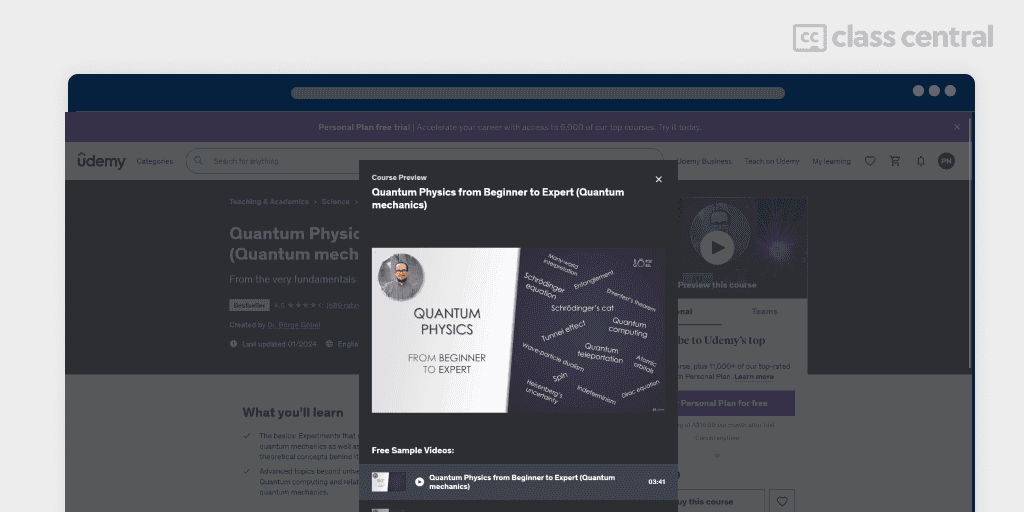
Quantum Physics from Beginner to Expert is a Udemy Bestseller designed to guide learners from basic principles to advanced concepts in quantum mechanics, including quantum computing and relativistic quantum mechanics. It covers essential experiments, theoretical foundations, and practical problem-solving techniques. The course is suitable for a wide range of learners, from beginners to those seeking a deeper understanding of quantum mechanics beyond traditional university courses.
Syllabus:
- Introduction to quantum physics
- Historical experiments motivating quantum mechanics
- Fundamental theoretical concepts
- Core quantum mechanics
- Detailed step-by-step solving of the Schrödinger equation
- Practical problem-solving in quantum mechanics
- Advanced quantum topics
- Quantum computing
- Relativistic quantum mechanics
- Application and integration
- Practical applications in modern technology and research
- Integration of quantum concepts with real-world phenomena
- Preparation for further study
- Condensed refresher for exams
- Bridging to university courses or enhancing current studies.
“I loved it! I had a lot of fun learning about all the fundamental for the QM, evethough (sic) the subject is very difficult, the way is explained is very friendly and interesting…” – Gabriel S., Udemy learner.
| Provider | Udemy |
| Instructor | Dr. Börge Göbel |
| Workload | 13 hours |
| Enrollment | 7.4K |
| Rating | 4.6/5.0 (585) |
| Cost | Paid |
| Certificate | Paid |
Best Quantum Mechanics Course in Hindi (SANJU PHYSICS)
Watched nearly 1.5 million times, Quantum Mechanics is a comprehensive session designed for students and professionals preparing for various exams including NET-JRF, GATE, UPSC, and JAM. It covers fundamental concepts and advanced topics in quantum physics through a series of lectures. The course includes discussions on the failure of classical theories, quantum postulates, experimental validations, and mathematical formulations of quantum mechanics.
Syllabus:
- Introduction and basic concepts, failure of classical (EM) theory
- Quantum phenomena and experiments: photoelectric equation, Compton’s effect, De Broglie hypothesis, and Davisson Germer experiment
- Quantum Theory Development: velocity, Heisenberg uncertainty principle, Schrödinger time dependent equation
- Wave functions and quantum states
- Quantum mechanics applications: Schrodinger time independent equation, expectation value, probability current density, and the Ehrenfest theorem
- Quantum mechanics in statistical mechanics: black body radiations, Rayleigh Jeans Law ‘Ultraviolet Catastrophe’, Planck’s Law
- Quantum potential problems: potential step, potential well/particle in a box, the potential barrier and quantum tunneling, the harmonic oscillator
- Advanced quantum mechanics: linear vector spaces.
“The best part of your videos is that you take complete time to tackle the difficult concepts , as result these concepts become so easy to understand …!!” – kunwarabhisheksingh6812, YouTube learner.
| Provider | YouTube |
| Channel | SANJU PHYSICS |
| Instructor | Sanjeev Kumar |
| Workload | 25 hours |
| Views | 1.4M |
| Cost | Free |
| Quizzes/Assessment Items | None |
| Certificate | Not Available |
Best Brief Overview of Quantum Mechanics (minutephysics)
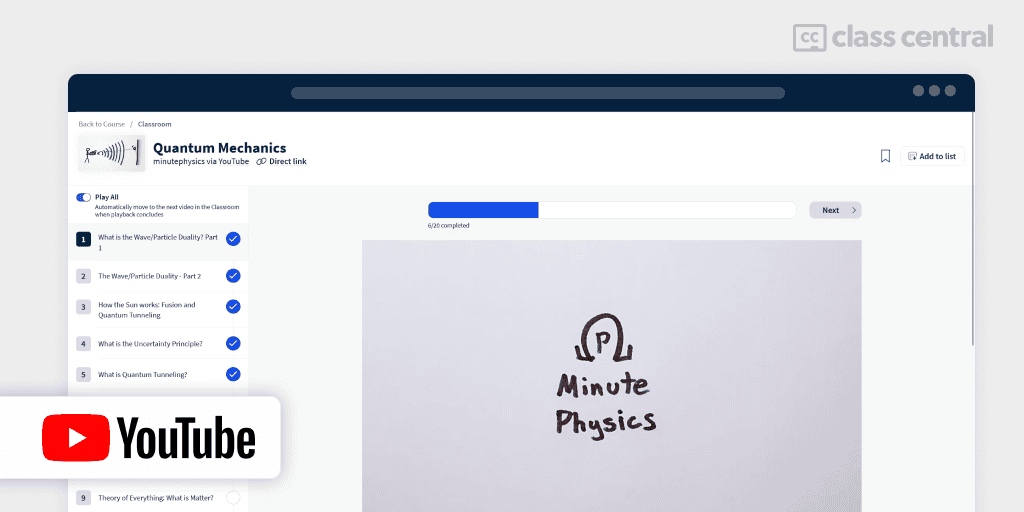
Do you just want to know what quantum mechanics is about, without trying to understand or calculate the mathematics behind it? Quantum Mechanics is a concise video course that covers fundamental and advanced topics in quantum mechanics, making it suitable for beginners interested in understanding quantum aspects of the universe.
Syllabus:
- Introduction to Quantum Mechanics and the Wave/Particle Duality
- Quantum Phenomena and Principles: how the Sun works, the Uncertainty Principle, quantum tunneling, Schrödinger’s Cat, and the No Cloning Theorem
- Applications and Theories: how lasers work, theory of everything and what is matter?
- Transporters and quantum teleportation, how to teleport Schrödinger’s Cat
- Hardy’s Paradox and the quantum double double slit experiment
- Albert Einstein: why light is quantum, how to discover weird new particles, emergent quantum quasiparticles, solution to the grandfather paradox
- Quantum computing: how quantum computers break encryption, Shor’s algorithm
- Miscellaneous: do photons cast shadows? and a better way to picture atoms.
“Wow! This is really neat! The drawings are great at helping explain the concepts!” – reflyersource2313, YouTube learner.
| Provider | YouTube |
| Channel | minutephysics |
| Instructor | Henry Reich |
| Workload | 1-2 hours |
| Views | 646K |
| Likes | 11K |
| Cost | Free |
| Quizzes/Assessment Items | None |
| Certificate | Not Available |
Best Quantum Optics Course (École Polytechnique)
If you want foundational knowledge in quantum optics, focusing on the behavior and properties of single photons, look no further than Quantum Optics 1 : Single Photons. It covers the transition from classical electromagnetism to quantum mechanics, exploring the quantization of light, the emergence of the photon concept, and the formalism required to describe quantum states of light. The course also delves into practical applications and technologies derived from quantum optical principles, such as quantum cryptography and quantum random number generators. It is ideal for those with a background in basic quantum mechanics and classical electromagnetism who are interested in advanced quantum optics concepts.
Syllabus:
- Quantization of Light
- Canonical quantization and single mode electromagnetic field
- Quantum optics expressions for photodetection signals
- Wave-Particle Duality
- Single photon interference and Mach-Zehnder interferometer
- Beam-splitter treatment and classical optics description
- Multimode Quantized Radiation
- Generalization of canonical quantization to multiple modes
- Features of quantum formalism and renormalization
- Real-World Photon Sources
- Types of one-photon sources: heralded and on-demand
- Multimode formalism for describing one-photon wave packets
- Wave-Particle Duality in Practice
- Real experiments demonstrating single photon wave-particle duality
- Considerations on experimental imperfections and quantum mysteries
- Quantum Technologies Based on Single Photons
- Quantum cryptography and quantum random number generators
- Photon polarization, qubits, and the no-cloning theorem.
For further studies, see Quantum Optics 2 – Two photons and more (13 hours).
“Very good introduction to the subject, I enjoyed the dynamics of the lessons. I am looking forward for the more advanced part 2!” – V.R., Coursera learner.
| Provider | Coursera |
| Institution | École Polytechnique |
| Instructor | Alain Aspect and Michel Brune |
| Workload | 33 hours |
| Enrollment | 26.1K |
| Rating | 4.8/5.0 (311) |
| Cost | Free audit |
| Quizzes/Assessment Items | Available |
| Certificate | Paid |
Best Quantum Computing Course (Delft University of Technology)
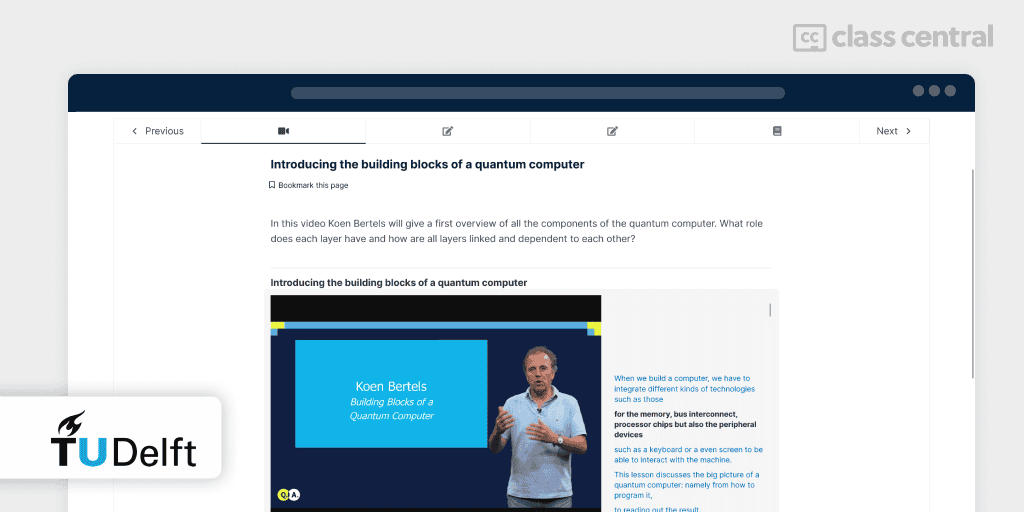
The Hardware of a Quantum Computer is produced by experts from QuTech. It aims to disseminate knowledge of the latest developments in quantum technology and encourages interactive learning through discussion forums.
Syllabus:
- Introduction to Quantum Computing
- Basic concepts of quantum computing
- Quantum information principles
- Overview of ket notation and qubits
- Construction of Qubits
- Different methods to build qubits
- Detailed Study of Qubit Types
- Topological qubits
- Spin qubits
- Superconducting qubits
- NV center qubits
- Interactive Learning and Knowledge Sharing
- Forum discussions
- Insights and experiences sharing
- Quantum Technology Developments
- Latest advancements in quantum technology.
If you want to continue your quantum computing studies, join Architecture, Algorithms, and Protocols of a Quantum Computer and Quantum Internet (36-48 hours) or you can enroll in the professional certificate Quantum 101: Quantum Computing & Quantum Internet (75-96 hours).
| Provider | edX |
| Institution | Delft University of Technology |
| Instructor | Lieven Vandersypen, Menno Veldhorst, Koen Bertels, et al |
| Workload | 36-48 hours |
| Enrollment | 27.9K |
| Rating | 4.7/5.0 (6) |
| Cost | Free audit |
| Quizzes/Assessment Items | Available |
| Certificate | Paid |
Best Quantum Mechanics Book (David J. Griffiths and Darrell F. Schroeter)

The third edition of Introduction to Quantum Mechanics was produced with the assistance of a second author, but this book is best known simply as “Griffiths”. Countless undergraduate classes have used it as a textbook and in preparation for the Physics Graduate Record Examinations (GRE) exam since the first edition appeared in 1995. It is praised for clear and accessible explanations of the foundations of quantum mechanics, in an attractive and informal style. For these reasons it’s considered ideal for self-study, or as an extra resource while taking an online course. Like other quantum mechanics studies, you’ll need a solid mathematical foundation before attempting to understand this book.
Contents:
- Part I: Theory
- The Wave Function
- Time-independent Schrödinger Equation
- Formalism
- Quantum Mechanics in Three Dimensions
- Identical Particles
- Symmetries and Conservation Laws
- Part II: Applications
- Time-independent Perturbation Theory
- The Variational Principle
- The WKB Approximation
- Scattering
- Quantum Dynamics
- Afterword
- Appendix: Linear Algebra
“I love this textbook! It’s a great introductory resource, I used this for my undergraduate Quantum Mechanics course. Definitely brush up on your math before hand, especially integrals and linear algebra…” – Madison, Amazon reviewer.
| Publisher | Prentice-Hall |
| Authors | David J. Griffiths and Darrell F. Schroeter |
| Workload | 508 pages |
| Rating (Amazon/Goodreads) | 4.6 (1.5K)/4.26 (2.6K) |
| Cost | Paid |
| Hands-on Content | Problems and exercises |
| Certificate | None |
Also Great Quantum Mechanics Book (Ramamurti Shankar)
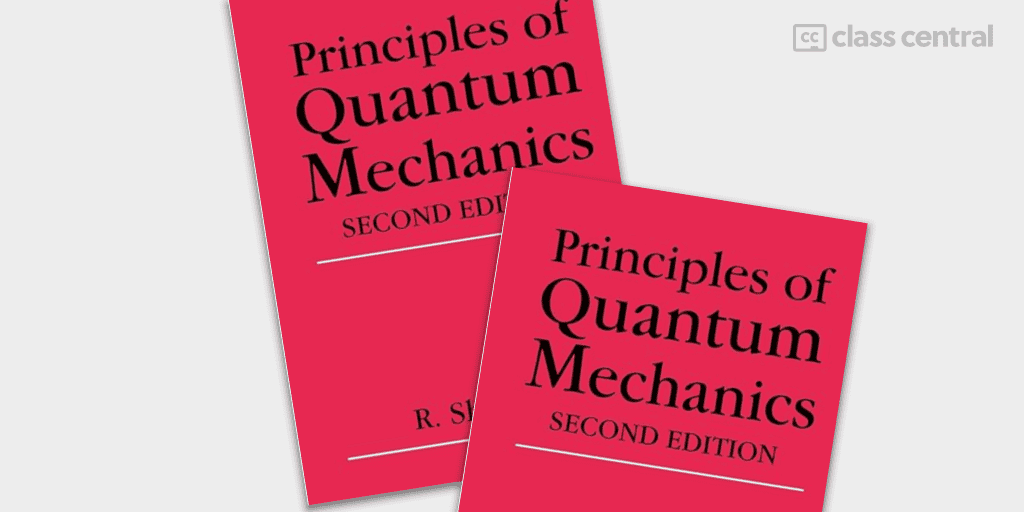
If you’re weaker in linear algebra, you may find Principles of Quantum Mechanics a bit easier to study than the Griffiths book mentioned above. The first chapter is a lengthy explanation of the mathematics needed to understand quantum mechanics.
Contents include:
- Mathematical introduction
- Classical mechanics and the classical limit
- The postulates, simple problems in one dimension, and the harmonic oscillator
- The path integral formulation of quantum theory
- The Heisenberg Uncertainty relations
- Systems with N degrees of freedom
- Symmetries and their consequences
- Rotational invariance and angular momentum
- The hydrogen atom, spin, and addition of angular momenta
- Variational and WKB methods
- Time-independent and time-dependent perturbation theories
- Scattering theory, the Dirac equation, and path integrals.
“…if you are interested in really learning quantum mechanics, this is where I’d recommend you start…” – Jason Dowd, Amazon reviewer.
| Publisher | Plenum Press |
| Author | Ramamurti Shankar |
| Workload | 694 pages |
| Rating (Amazon/Goodreads) | 4.5 (351)/4.23 (873) |
| Cost | Paid |
| Certificate | None |
Honorable Mentions
Georgetown University has two courses by Professor James Freericks who has received many accolades for his passion and engaging teaching style. Currently, both courses are archived on edX. This means that you can view the course videos and see quiz questions, but you can’t submit answers and a certificate is not currently available. Quantum Mechanics for Everyone (42-60 hours) is in Class Central’s Best Online Courses of All Time list, while Quantum Mechanics (145-210 hours) is more comprehensive.
Quantum Mechanics from the University of Colorado Boulder and led by John W. Daily, will take you around 5-6 hours. This course and the Quantum Mechanics for Engineers Specialization were close runners-up to the courses mentioned above, according to learners’ ratings.
What next?
For support and discussions with fellow quantum mechanics learners, try the Reddit community with 10K members or Stack exchange.
Why You Should Trust Us
Class Central, a Tripadvisor for online education, has helped 60 million learners find their next course. We’ve been combing through online education for more than a decade to aggregate a catalog of 200,000 online courses and 200,000 reviews written by our users. And we’re online learners ourselves: combined, the Class Central team has completed over 400 online courses, including online degrees. I’ve personally completed over 200 online courses in a variety of topics.
How We Made Our Picks and Tested Them
Trying to find “the best” can be daunting, even for those of us who live and breathe online courses. Here’s how I approached this task.
First, I combed through Class Central’s Catalog and the internet to find a variety of free and paid open courses and resources, some with certificates. You don’t need to enroll in a university to learn about quantum mechanics.
When choosing resources, I considered the following factors:
- Renowned Institutions: I looked for recognized institutions in quantum mechanics
- Instructor experience: I sought instructors and authors with extensive experience in quantum mechanics and engaging presentation styles
- Popularity: I checked numbers of enrollments and views to find popular courses
- Course content: I examined courses that covered a range of topics and presentation styles, including the basics and more advanced topics. I watched some course videos to sample courses I hadn’t already taken
- Reviews: I read reviews (when available) to get a sense of the quality of each resource, leveraging the Class Central database with its thousands of course ratings and reviews written by our users as well as available provider reviews.
Then, I defined the scope for these recommendations. A quantum mechanics course or book can cover various levels and aspects, so I chose top resources from various sub-fields.
Ultimately, I used a combination of data and my own judgment to make these picks. I’m confident these recommendations will be a reliable way to learn about quantum mechanics.











Mark Weitzman
The MIT course is far more comprehensive and challenging than any of the other courses in the list. But it is 3 courses (8.04x, 8.05x, and 8.06x). It runs periodically on MITx Online with almost all of the course (except exams) available for free. It is also available with the videos, notes, assignments etc. on MITOCW. Additionally the notes have been turned into what is now probably the best undergraduate textbook on Quantum Mechanics: Mastering Quantum Mechanics Essentials, Theory, and Applications by Barton Zwiebach..